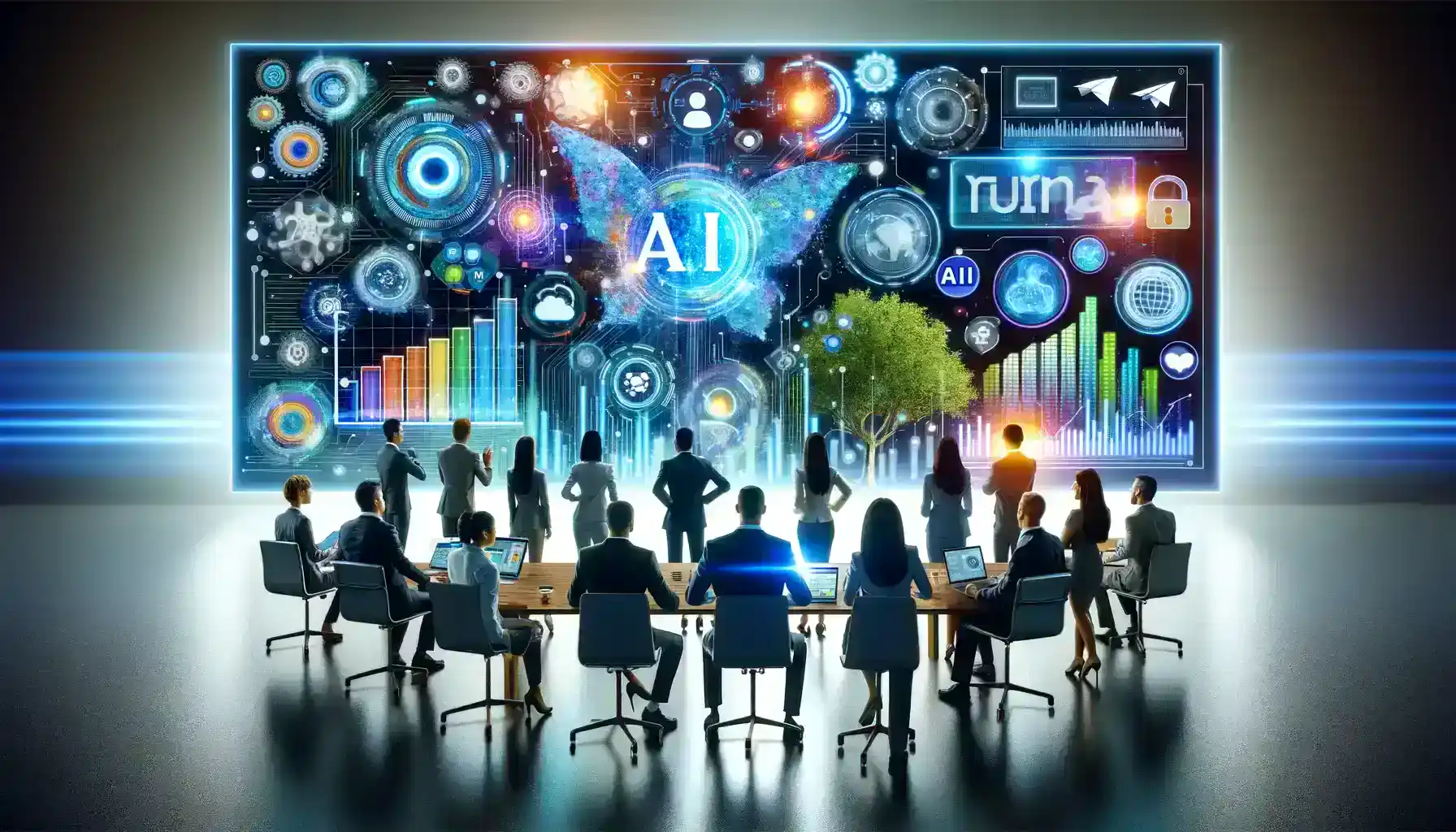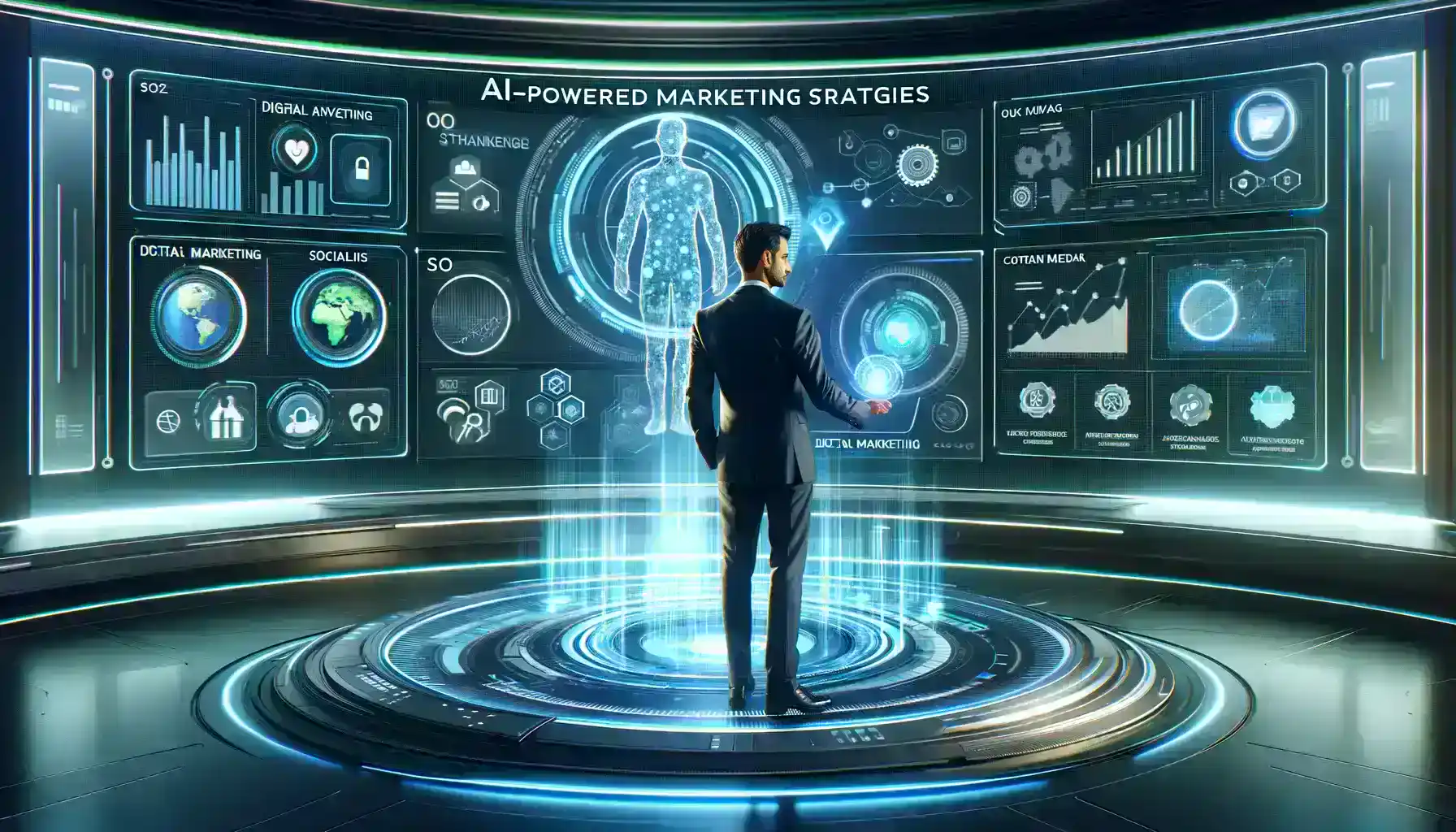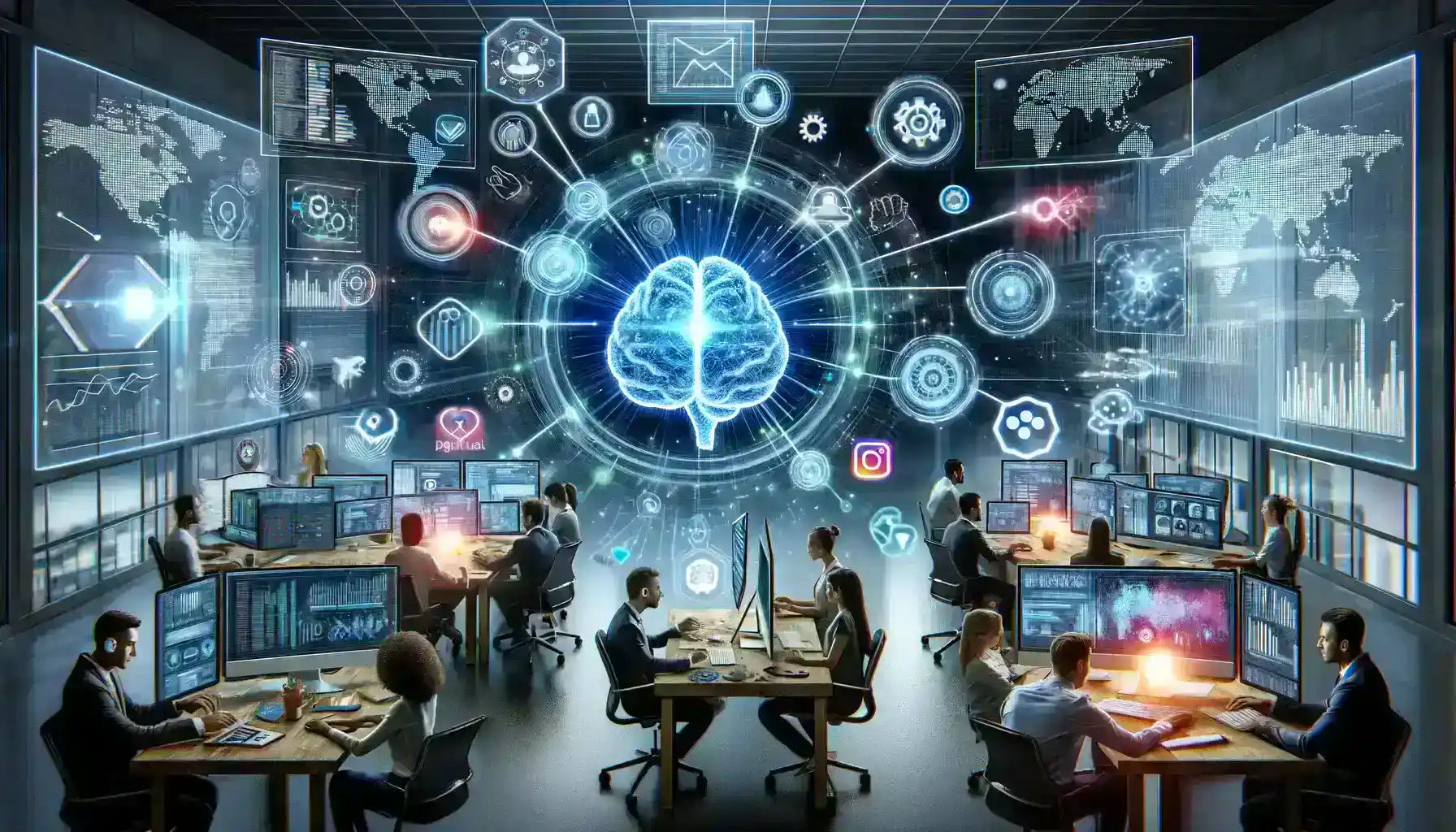Table of Contents
In today’s fast-paced digital landscape, staying ahead of the competition and achieving marketing excellence is no small feat. With consumers being bombarded by advertisements from every corner of the internet, it’s crucial to stand out and make a meaningful impact. Enter AI-powered marketing strategies – the game-changer that can revolutionize your digital advertising efforts.
In this environment of intense competition and rapidly evolving consumer preferences, AI-powered marketing strategies emerge as a game-changer, poised to revolutionize the landscape of digital advertising. This comprehensive guide will delve into five powerful AI-powered marketing strategies to help you achieve digital advertising excellence.
The Power of AI-Powered Marketing
Artificial Intelligence (AI) has rapidly become a driving force behind innovation in various industries, and marketing is no exception. AI-powered marketing leverages machine learning, data analytics, and automation to enhance marketing campaigns, personalize customer experiences, and optimize advertising spend. The result? Smarter, more efficient, and highly effective AI-powered marketing strategies.
Automation is another critical aspect of AI-powered marketing. It can handle routine and repetitive tasks, such as sending out personalized emails or managing social media posts, with remarkable efficiency.
AI-powered marketing represents a transformational shift in how businesses engage with their audience. It empowers marketers to deliver the right message, to the right person, at the right time, and through the right channel.
By embracing these strategies and harnessing AI-powered marketing, businesses can not only keep pace with the competition but also lead the way in the dynamic world of digital advertising.
AI-Powered Marketing Tools
These AI-powered marketing tools cover a range of marketing functions, from content creation and optimization to advertising, analytics, and customer engagement. Depending on your specific marketing goals and needs, you can leverage these tools to take your campaigns from good to great by harnessing the power of artificial intelligence.
- HubSpot AI: HubSpot offers AI-powered tools for marketing automation, content optimization, and customer insights. It helps you personalize content, automate marketing tasks, and make data-driven decisions to enhance your campaigns.
- Revealbot: Revealbot uses AI for Facebook and Instagram ad campaign automation. It helps you optimize ad spend, set rules for ad management, and track performance in real time.
- Pardot by Salesforce: Pardot is a B2B marketing automation platform that incorporates AI to enhance both inbound and outbound lead generation, cold emailing tools, and customer engagement strategies.
- Salesforce Einstein: Salesforce Einstein is an AI-powered CRM tool that enhances customer relationship management, and lead-scoring sales automation for improved campaign targeting.
- Hootsuite Insights: Hootsuite Insights utilizes AI to provide social media analytics and sentiment analysis. It helps you monitor brand mentions and audience sentiment across social platforms.
- Leadzen AI: Leadzen.ai is a prospecting tool that uses AI technology to automate the process of generating leads and connections. It provides real-time, accurate, and complete data, and helps users maximize the value of that data.
- Clearout: Clearout.io is an AI-based prospecting tool that offers a LinkedIn email finder chrome extension to build targeted prospect lists from LinkedIn. It collects pre-verified contact information like email addresses and phone numbers of the LinkedIn prospects who match your ideal customer profiles.

1. Hyper-Personalization for Enhanced Engagement
Personalization has become a buzzword in the AI-powered marketing world, but with ArtificiaI Intelligence, it goes beyond just addressing customers by their first name in an email. AI-powered marketing enables hyper-personalization, where every customer interaction is tailored to their unique preferences, behaviors, and needs.
This strategy involves analyzing a multitude of data points to understand each customer’s unique behavior, interests, and needs.
- Customer Segmentation: AI algorithms can analyze your customer data to segment your audience into smaller, more specific groups based on demographics, past interactions, purchase history, and more.
- Predictive Analytics: By tracking user interactions across your website, app, or other digital channels, AI can identify patterns and preferences, enabling highly targeted content recommendations and product suggestions.
- Dynamic Content: AI enables the creation of dynamic content that adapts in real-time based on a user’s profile and behavior. This means that two different website visitors might see entirely different content and offers
Benefits
- Enhanced Engagement: Hyper-personalized content and recommendations resonate more with customers because they feel like the brand truly understands and caters to their unique needs and preferences.
- Improved Conversions: When customers encounter tailored offers and product recommendations, they are more likely to make a purchase or take the desired action.
- Brand Loyalty: The personalized experience fosters a deeper connection between the customer and the brand, leading to increased loyalty and repeat business.
Amazon‘s recommendation engine is a prime illustration of hyper-personalization. It uses AI to analyze a user’s browsing and purchase history to offer highly personalized product recommendations, resulting in significantly increased sales and customer satisfaction.
2. Predictive Analytics for Data-Driven Decisions
In the digital advertising realm, data is king. Predictive analytics powered by AI can help you harness the vast amounts of data at your disposal to make data-driven decisions. This means optimizing your ad spend, content, and targeting for maximum ROI. Predictive analytics, powered by AI, allows marketers to extract insights from vast amounts of data to make informed decisions.
- Customer Behavior Prediction: AI can analyze historical data to predict future customer behavior. This allows businesses to tailor their marketing strategies to anticipate customer needs and preferences.
- Ad Spend Optimization: Machine learning algorithms can optimize the allocation of your advertising budget by identifying the most promising channels, campaigns, and demographics to target. Effectively managing your SaaS marketing budget ensures that every dollar contributes to meaningful user acquisition and retention.
- Performance Forecasting: AI can predict the likely performance of different ad creatives and messaging, helping marketers fine-tune their campaigns for maximum impact.
Benefits
- Optimized Spending: Predictive analytics helps businesses allocate their advertising budgets more efficiently, reducing wasted spend on underperforming campaigns or channels.
- Improved ROI: Data-driven decisions result in campaigns that are more likely to yield a positive return on investment, maximizing the impact of each advertising dollar.
- Proactive Strategy: By forecasting future trends and customer behaviors, marketers can take proactive steps to stay ahead of the competition and adapt their strategies accordingly.
Netflix leverages predictive analytics to suggest content to its users. By analyzing viewing habits and preferences, Netflix recommends shows and movies that align with individual tastes, ultimately improving user engagement and retention.

3. Chatbots for 24/7 Customer Support
Customer service is a critical aspect of digital advertising, and AI-powered chatbots are revolutionizing the way brands interact with their customers. These virtual assistants can provide instant responses, answer frequently asked questions, and even guide customers through the purchase process.
- Chatbot Integration: Chatbots can be seamlessly integrated into various digital channels, including websites, social media platforms, and messaging apps, to provide real-time assistance.
- Natural Language Processing (NLP): Leveraging NLP technology, chatbots can understand and respond to customer queries in a natural and conversational manner, offering a more human-like interaction.
- Personalized Recommendations: Chatbots can analyze customer inquiries and preferences to deliver personalized product recommendations and content.
Benefits
- Always Available: Chatbots offer 24/7 customer support, ensuring that customers can receive assistance whenever they need it, even outside regular business hours.
- Efficiency: By handling routine inquiries and tasks, chatbots free up human agents to focus on more complex customer issues, improving overall efficiency.
- Consistency: Chatbots provide consistent responses, ensuring that customers receive accurate information and support every time they engage with the brand.
Facebook Messenger chatbots allow businesses to provide instant customer support and even facilitate purchases within the messaging platform.

4. A/B Testing with Machine Learning
A/B testing has long been a staple of AI-powered marketing strategy, but with AI, it becomes more sophisticated and efficient. Machine learning can help you quickly identify winning variations and continuously optimize your campaigns for better results. With AI and machine learning, A/B testing becomes more sophisticated and efficient.
- Automated Testing: AI can create and test multiple variations of ads, content, or marketing campaigns in real-time, automatically selecting the most effective ones based on performance data.
- Dynamic Optimization: Machine learning algorithms continuously adjust campaign parameters, such as bidding, targeting, and content, to optimize performance and deliver the best results.
- Ad Creative Insights: AI analyzes ad creative elements, identifying which images, copy, or design components resonate most with the target audience, and provides actionable insights for improvement.
Benefits
- Quick Insights: Machine learning algorithms can rapidly identify winning variations, enabling marketers to make real-time adjustments to campaigns for better results.
- Continuous Optimization: Campaigns are continuously optimized based on data analysis, resulting in improved performance over time and maximizing ROI.
- Efficiency: Automated A/B testing saves time and resources compared to manual testing, allowing marketers to focus on strategy and creativity.
Google Ads utilizes machine learning to optimize ad delivery, helping advertisers get the most value from their campaigns. By automatically adjusting ad placements, bids, and targeting based on real-time data, Google Ads ensures that advertisers get the most value from their campaigns, driving better results.
5. Voice Search Optimization (VSO)
With the rise of voice-activated devices like smart speakers and virtual assistants, voice search optimization has become crucial. AI can help businesses tailor their content and advertising to align with the unique characteristics of voice search queries.
- Natural Language Processing: AI-powered Marketing in NLP is used to understand the intent and context behind voice search queries, enabling content alignment and relevance.
- Local SEO: Optimizing content for local voice searches is crucial, as many users seek nearby products and services through voice queries.
- Featured Snippets: Creating content that succinctly answers common questions increases the likelihood of being featured in voice search results, enhancing visibility.
Benefits
- Increased Visibility: Optimizing for voice search queries improves your chances of being a top result when users seek information through voice-activated devices.
- Enhanced User Experience: Voice search optimization ensures that content is accessible and relevant to voice search users, resulting in a positive user experience.
- Competitive Advantage: As voice search continues to grow in popularity, businesses that optimize for it gain a competitive edge in reaching voice-activated device users effectively.
Domino’s Pizza allows customers to place orders using voice commands through platforms like Amazon Alexa, streamlining the ordering process.
Conclusion
These five AI-powered marketing strategies represent a significant advancement in the digital advertising landscape. They empower marketers to engage with customers on a highly personalized level, make data-driven decisions, provide round-the-clock customer support, optimize campaigns efficiently, and adapt to the growing trend of voice search.
AI-powered marketing strategies are no longer a luxury; they are a necessity in today’s digital advertising landscape. By implementing these five strategies – hyper-personalization, predictive analytics, chatbots, A/B testing with machine learning, and voice search optimization – you can supercharge your campaigns and achieve digital advertising excellence.
AI is a tool that empowers marketers to make smarter decisions and deliver better customer experiences. Embrace this technology, stay agile, and continuously innovate to stay ahead of the competition. As you integrate these AI-powered marketing strategies into your arsenal, you’ll not only boost efficiency but also unlock new opportunities for growth and success in the dynamic world of digital advertising.